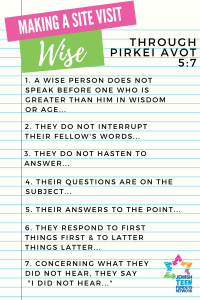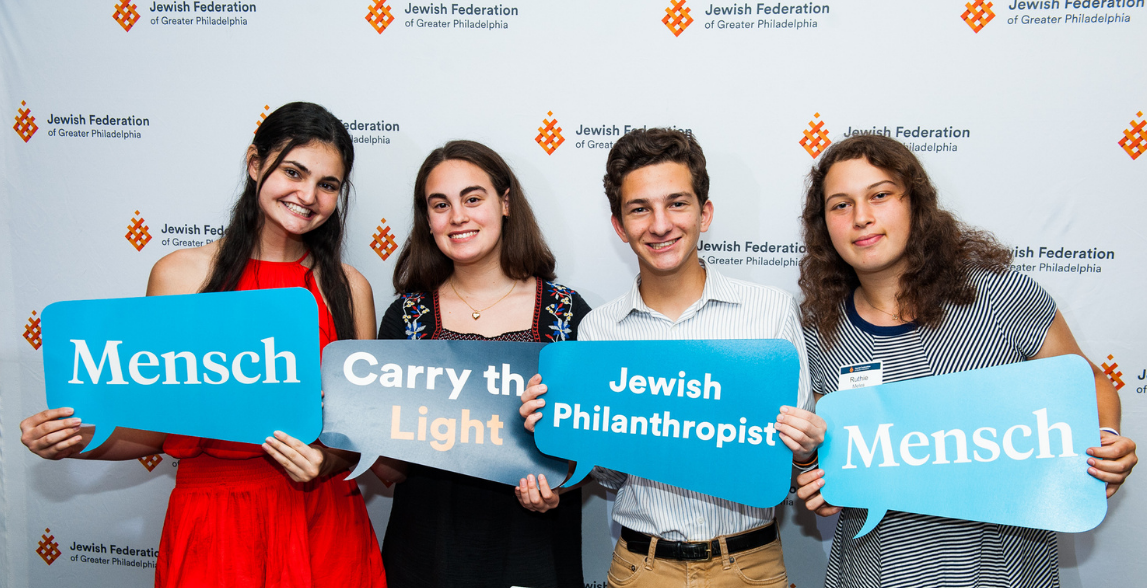By: Danielle Segal, JTFN, Project Manager

Pirkei Avot: the pithy Buzzfeed of our Jewish tradition. Want life-hacks on pretty much anything? You will find some wonderful words of wisdom in Ethics Of The Fathers. Whether it’s advice on friendships[1], the importance of charitable giving[2], or instructions on how to be a part of this world[3], Pirkei Avot is our loyal ally in living and giving Jewishly.
I had the absolute pleasure recently of joining the Jewish Community Youth Foundation (JCYF) of Princeton NJ, during their 9th grade site visit to New York City. The focus of the 9th grade group is national social service, so I accompanied the group as they visited a New York based Jewish non-profit organization for their first site visit.
“What has this site visit got to do with Pirkei Avot?” I hear you ask. What a great question. Questions are vitally important during a site visit as the teens navigate what might be an unfamiliar organization, a new program idea, or a complicated budget spreadsheet. However, during the JCYF’s visit, I was not only deeply impressed by the depth and relevance of the questions they asked, but I was also blown away by their general demeanor, respect for the process, and overall attitude.
And now onto Pirkei Avot. There is an excellent quote describing the characteristics of a wise man (or wise person in our case!): There are seven things that characterize …a wise man. A wise man does not speak before one who is greater than him in wisdom or age. He does not interrupt his fellow’s words. He does not hasten to answer. His questions are on the subject and his answers to the point. He responds to first things first and to latter things later. Concerning what he did not hear, he says “I did not hear.”(Pirkei Avot 5:7) The JCYF teens were truly wise during their site visit and exemplified all these characteristics, and more.
So let’s break it down. How can this quote give us the blueprint for a successful and meaningful site visit:
1. A wise person does not speak before one who is greater than him in wisdom or age…
Wisdom is relative – I might know more about philanthropy than a bee, but a bee is definitely wiser than me about making an abode purely out of hexagonal honey! When teens enter the site visit space, even after careful research, the organizational representative most probably knows more about the organization than the teen. Listen to the information or presentation first, internalize and make notes before delving into question time.
2. They do not interrupt their fellow’s words…
Chances are a site visit will be conducted by a group of teens, rather than just one. Make sure everyone has a chance to ask questions or make comments. Maybe prepare some key talking points in advance and divide it evenly amongst the group.
3. They do not hasten to answer…
The organization might ask the teens direct questions about the funding, their mission, or what their teen program is. The organization might not even have heard of a Jewish teen philanthropy program before! Take a breath, think for a minute and prepare a clear and helpful answer.
4. Their questions are on the subject…
As interesting as their life story might be, or where they went to school, site visits can be limited on time. Ask relevant questions of your organizational representative so that the group can make an informed decision about whether to fund their project.
5. Their answers to the point…
Yes some questions are tough to ask, but sometimes, rather than dancing around the subject, it’s important to get to the point, even if the question seems a little awkward: “if we don’t fund you, will this program happen?”, “What sets you apart from other organizations that are doing similar work?”
6. They respond to first things first and to latter things later…
A site visit schedule might be decided by the host organization, or the teens might be asked to call the shots! Think about what order will make the most sense during the visit. What experience will give the teens the most meaningful access to the organization’s program and structure? Would it be more helpful to speak to a representative first before seeing a program in action?
7. Concerning what they did not hear, they say “I did not hear.”…
Teens will be taking in a large amount of information, both verbal and visual, during a site visit. It would be hard for anyone to take in all that stimulation at once. If something is not clear, or there is some confusion about the information being presented, ask further questions! There is nothing wrong with asking an organizational representative to repeat themselves or reword verbiage for clarity.
Although the wise contributors of Pirkei Avot did not attend a non-profit site visit (although I’m sure Hillel would have made an excellent teen board member!), their words resonate as we look to conduct ourselves justly and Jewishly as we step out of our board rooms and enter the physical turf of the non-profit world.
[1] Pirkei Avot 4:18 – “Rabbi Shimon ben Elazar says: Do not assuage the anger of your friend at the time of his anger; do not console him at the time when his deceased lies before him; do not question him at the time of his vow; and do not seek to see him at the time of his humiliation.”
[2] Pirkei Avot 2:8 – “The more tzedakah, the more shalom.”
[3] Pirkei Avot 1:14 – “He [Rabbi Hillel] used to say: If I am not for me, who will be for me? And when I am for myself alone, what am I? And if not now, then when?”
